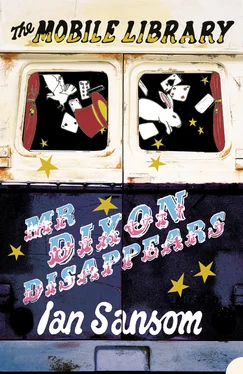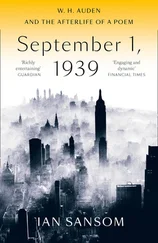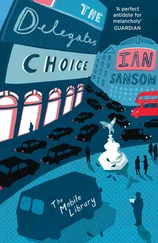The Mobile Library
Mr Dixon Disappears
Ian Sansom
For Sean
2005–2006
R.I.P.
Cover Page
Title Page The Mobile Library
1
2
3
4
5
6
7
8
9
10
11
12
13
14
15
16
The Mobile Library
Acknowledgements
About the Author
Also by Ian Sansom
Copyright
About the Publisher
He was sick of the excuses and the lies. He was tired of the evasions and the untruths, of people refusing to stand up and speak the truth and take responsibility for their own actions. It seemed to him like yet another symptom of the decline of Western civilisation; of chaos; and climate change; and environmental disaster; and war; disease; famine; oppression; the eternal slow slide down and down and down. It was entropy, nemesis, apotheosis, imminent apocalypse and sheer bad manners all rolled into one.
People were not returning their library books on time.
‘I’m sorry, I forgot,’ people would say.
And, ‘I’ve been in hospital.’
Or, ‘I liked it so much I lent it to my sister.’ (Or my brother, or my mother, or my father, or my cousin, or my friend, who lives up country, or in Derry, or over there in England, actually, and isn’t that where you’re from?)
Or, ‘Sure, I brought it back already.’
Or, ‘No. I don’t think so. I never had that one out.’
Or, ‘I put it back on the shelves myself. Some other one must have it out now.’
Or, ‘Someone stole it.’
Or, ‘I left it on the bus.’ Or in the bath, or on holiday, or in the car and it’s in for servicing.
And, even, once, ‘It was a bad book, full of bad language and bad people doing bad things, so I threw it away.’ (Well, what the hell did Mrs Onions expect, borrowing Last Exit to Brooklyn ? Israel had asked her, after he’d got her to pay the replacement cost of the book, and a fine, and had steered her safely back towards her usual large-print romantic fiction, and it turned out she had a cousin who’d emigrated to New York back in the sixties and she’d never visited and she was toying with the idea of a trip over for her seventieth birthday and she’d wanted to find out what it was like over there, and frankly, there was no chance of her visiting now after reading that filth, they were going to go to Donegal for a few days instead, to see her sister, down in Gweedore, which was quite far enough, and did Israel know if Frank McCourt had written any others?)
But mostly when they were challenged about their overdue or unreturned books, the good people of Tumdrum would just narrow their eyes and look at you with a blank expression and purse their lips and say, ‘Book? What book?’
It wasn’t funny. It was cracking him up.
He patted his face with cold water and stared at himself, freshly shaved, in the mirror hung on a nail above the makeshift sink.
He squinted at himself.
In his teens and even into his early twenties Israel had spent a lot of time looking into mirrors, trying to work out whether he was good-looking or not, which was quite a project, a hobby almost; he could have spent hours at it. Was his nose perhaps a little too large, his eyes a little too narrow, his lips too full, his ears not quite right? Pressing, important and immense as those questions had once appeared to be, they no longer seemed to bother him, he didn’t know why – he supposed that maybe there comes a time in every man’s life when he makes up his mind and decides one way or another about the cut of his own jib and has to learn to live with it, and maybe he’d reached that point, or maybe Tumdrum had just cured him of himself. Either way, it didn’t seem to bother him any more, the question of whether he was good-looking or not. What bothered him now was: am I there at all? Or, where am I? He often found himself glancing at himself in the wing-mirror of the van, trying to catch himself out, trying to locate himself, checking for signs of life.
He tried to think who it was he reminded himself of: his father? No. Not his father. Israel was too wide and too plush, too messy: the glasses; the nose; the unruly hair. His dad had always been well turned-out; he was more sports-casual, his dad. Israel reminded himself more of the father of one of his best friends from school, a man who was an art lecturer at a sixth-form college, a tense, fragile, bitter man who wore cords during the week and who had books in the house and who sometimes listened to jazz and blues, and who drank wine to excess, and because Israel’s own dad was just a boring old accountant and a moderate man and pretty much happy with his lot in life and with his pastel pullovers and his slacks, it was this stubbly, corduroy-wearing, French-film-watching saddo who had come to represent what Israel thought of as the fully-formed adult male: a copy of Miles Davis’s Kind of Blue and empty wine bottles and the smell of freshly ground coffee; his friend’s dad had made north London seem like the Left Bank, which was where Israel had always assumed he would end up himself, sitting at a café table eating croissants and writing meditative works of philosophy.
But instead he was here, in Tumdrum, in his lodgings, in the converted chicken coop on the Devines’ farm, and he looked down at the ground, down past his big white buttery belly and his cords – an old pair of Mr Devine’s, phosphorescent cords, cords with a nap and shine like the glint of green on mouldy ham – and there were empty wine bottles stacked everywhere in the room, under the bed and on the dresser – Tumdrum not having yet caught up with recycling – and he had to admit, as he was getting older he was becoming partial to a bit of Miles Davis himself, and he liked his coffee in the mornings just so, if he could have got hold of fresh coffee in the mornings. He wasn’t even thirty and he’d become his best friend’s dad.
He prodded his little round glasses up onto his forehead and rubbed his chin: it felt horrible, like touching a slightly damp shrink-wrapped skinless chicken breast from Marks and Spencer; not that he had touched a shrink-wrapped skinless chicken breast from Marks and Spencer for a long time, what with being a vegetarian and also being stuck in the middle of the middle of nowhere in the north of the north of Northern Ireland and having to drive around in a mobile library which by rights should have been scrapped and made into a novelty public sculpture years ago.
So, god.
He was still here, Israel Armstrong, BA (Hons), and just about the only thing that was keeping him sane was lovely Rosie, Rosie Hart from the First and Last, who’d been helping him out on the mobile in an unofficial capacity. It was a casual sort of arrangement, but it seemed to work. On the days when Ted was busy with his taxi firm (‘Ted’s Cabs: If You Want To Get There, Call the Bear’), Rosie would come in and give Israel a hand, and help him get loaded up, and sort out the tickets and clear out the van, and help him find the service points and issue the books, and she was in many ways the ideal helpmeet and librarian: she was young and presentable, and she didn’t eat garlic, or shake, or suffer from dyspepsia, or rage, or otherwise exhibit any eccentric or anti-social behaviours, and her bartending experience meant that she was fair but firm and she had an instinctive way with people, while Israel, on the other hand, could sometimes come across as a little…brusque. He knew it himself. He wasn’t proud of it.
If someone came in to the mobile, for instance, a borrower – or a ‘customer’ as Linda Wei, Deputy Head of Entertainment, Leisure and Community Services at Tumdrum and District Council insisted on calling them – and they asked for a book, Israel would always start out with good intentions.
Читать дальше












